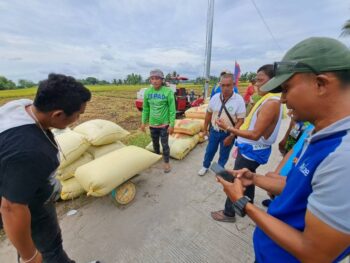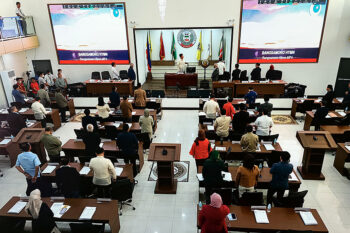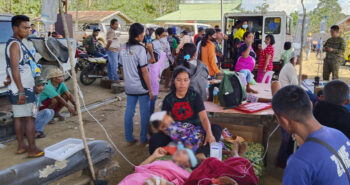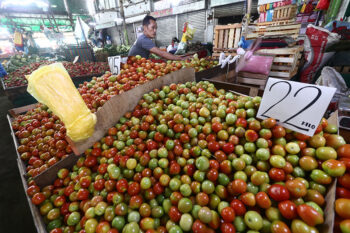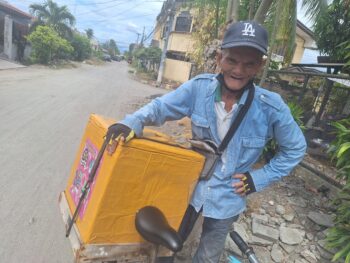
ZAMBOANGA CITY (MindaNews / 18 February) – Last Friday, February 12, was a national holiday in the country in observance of the Lunar New Year amidst the ongoing political tension over Chinese actions in the West Philippine Sea. In the Sulu Archipelago these days, the once thriving local Chinese community, colloquially referred to as “Lannang”, had seen the community decreasing in number and presence due to the lingering peace and order situation. The kidnap-for-ransom activities by violent groups ended up targeting and decimated the number of once flourishing Lannang businesspeople and their businesses in this part of the world.
The strong presence of Chinese establishments – from department stores to cinemas, from restaurants to pawnshops – in downtown Jolo and Siasi is long gone. Banks, which back then were numerous, are reduced to a few. The Chinese temple in Indanan and Siasi are non-functional. Tong Jin, the only Chinese school, had long closed its doors. The “Tinda Laud” (Store at Sea) in Jolo, Chinese Piers and Tong-Sinah (Chinese Point) are now in name only. Lannang families had left. In short, the Lannang are now in diaspora. Perhaps the only Lannang community that still remains can be found in Bongao and Tabawan, Tawi-Tawi, where businesses thrive amidst a relatively peaceful in this southernmost province.
The beginning of Lannang presence and Sulu’s interaction with China can be traced to the Ming Shi-lu, the official records of the Ming Dynasty from the 14th to the 17th century (1368-1644). One interesting thing about these texts is its reference to polities and societies in South East Asia, including those in the Sulu Archipelago.
So while we know the history of Sulu through the establishment of the Sulu Sultanate by Shariful Hashim in 1405, little is known about its polity prior to this period. Here is where Ming Shi-lu comes handed as it has records of interaction with polities from the Sulu Archipelago. Sulu entries in the Ming Annals were recorded under the reign of Emperors Yong-le (1398 to 1424), Hong-xi (1424 to 1425), Xuan-de (1425 to 1435) and Wan-di (1572 to 1620).
The First Visit (1417)
The first entry in Sulu was recorded during the reign of Emperor Yong-li. The first visit from Sulu to the Middle Kingdom was in the 15th year reign of Emperor Yong-li equivalent to September 1417. The imperial record noted Sulu’s three (3) polities2:
- Ba-du-ge Ba-da-la (Paduka Batara), the administrator (權) of the Eastern country of Sulu. Our question is, where is this Sulu Eastern country? Sulu mainland perhaps?
- Ma-ha-la-zha Ge-la-ma-ding (Maharajah Kumalarang), the administrator of the Western country of Sulu. Our question is, where is this Sulu Western country? Basilan perhaps?
- Ba-du-ge Ba-la-bu (Paduka Prabhu), the wife of the deceased administrator of the Sulu dong (峒). ‘Dong’ is the Chinese word for natives or aborigines. Who are these aborigines?
These three Sulu rulers led a contingent of 340 persons composed of family members and accompanying chieftains. Accordingly, this contingent went to Court to offer a memorial engraved in gold and to offer tribute, including pearls, precious stones, tortoise-shell and other products.
Worth notetaking is the level of accord and hospitality extended to this contingent which is stated as those accorded to the king of the country of Melaka.
On the 7th day of the visit, there was a formal ceremony at the palace where these Sulu rulers were formally enfeoffed – Paduka Batara was enfeoffed as the Eastern king of the country of Sulu; Maharajah Kumalarang was enfeoffed as the Western king of the country of Sulu; and Paduka Prabhu was enfeoffed as the ruler of the Sulu dong.
After being declared fiefs of their respective territories, “title patents, suits of clothing, a set of formal clothing, seals, horses with saddles and ceremonial insignia were conferred upon them”. Additionally, “headwear, belts and clothing made from patterned fine silks interwoven with gold thread, as appropriate, were conferred upon the accompanying chieftains, who totalled over 340 persons”.
After about a month staying at the imperial capital, it was time for the Sulu rulers to return home.
As they prepared to return home, each of them was showered “a gold and jade belt, 100 liang of gold, 2,000 liang of silver, 200 bolts of silk gauzes, brocades and patterned fine silks, 300 bolts of thin silks, 10,000 ding of paper money, 3,000 guan of cash, a set of gold-embroidered mang dragon robes and a set of qi-lin robes were conferred upon each of them”, while the accompanying chieftains were given “patterned fine silks, variegated thin silks, cash and paper money”, as appropriate to their ranks.
When they reach Dezhou on their journey home, an unfortunate event happened. Paduka Batara, the Eastern king of the country of Sulu, died of his illness. According to the Ming Shi-lu, “when the death was announced, officials were sent to confer sacrifices and the authorities were commanded to build a tomb and to entomb him with the honours due to a king”.
The Emperor personally composed a text, and a tablet and grave alley were erected. The Emperor’s epithet to Paduka Batara is as follows:
The vast land under the blue sky and white clouds, This is where all creatures live and multiply; A Sacred God formed in nature, Governs all humankind, Permeates the spirituality of all ethics, Nurtures people in all corners.
It is as virtuous and magnanimous as the dew, That gives life to all lakes and seas, lands and continents.
Among the nobility who came to us bearing precious gifts, Friends who came to meet us in our halls, Included great Khans from the west, And heads of state from faraway lands.
They were not hindered by mountains and seas, Unafraid of all sorts of dangers and difficulties, They all came to visit our great Middle Kingdom. It was like that in the past! Still like that at present.
The king from the Kingdom of Sulu, Dreamt of visiting the Middle Kingdom. He personally led his family and officials, Including respectable men with white hair, Innocent children and romantic young people, They braved the wind and the waves, Traveled a great distance to visit our capital.
During the meetings they were so respectful, So sincere in our conversations. The king was moderate Wise and rational in his ways, Such a king with extraordinary talent and knowledge.
To show my respect for his loyalty and goodness, It was just right that I repaid him with valuable gifts; A gold seal with red ribbon, The title Eastern King of Sulu, And wished him the best in building his state and clan.
The autumn wind of the ninth month, Accompanied the Eastern King in his long journey home. Unfortunately he fell ill in Dezhou, Left mankind so abruptly. Oh my good friend! May the clouds give you a ride to heaven.
There is a mound in the Lubei Plains, Where green pines grow, There lies the tomb of the Eastern King. He sleeps and rests in eternal peace. The glorious name of Paduka Batara, Shall live on for generations to generations. Every time people see this old tomb, It will be like meeting the Great Spirit.
It was also decreed that “the king’s consort, concubines and servants, a total of 10 persons remained to watch his grave and were instructed to return home after three years. Also, an envoy was sent with Imperial orders of instruction for the king’s eldest son Du-ma-han (Alt: Du-ma-she), noting:
To Batara Paduka’s eldest son and successor, Emperor Yong-le noted: “Your father knew how to respect China. He personally led his family members and attendant ministers across the sea for 10,000 li and came to Court. I looked on his sincerity with special affection, enfeoffed him as king, conferred bountiful rewards upon him and sent people to escort him back to his country. However, when the boat reached De-zhou, he died of illness. When I heard of this, I was deeply grieved.
The burial and sacrifices have already been arranged in accordance with the rites…”
Emperor Yong-le added, “…You are the eldest son of the primary wife. Of the people in your country, it is appropriate that you inherit the title and keep peace in the border feudatory (藩服). Now I am especially enfeoffing you as the Eastern king of the country of Sulu. You should increasingly act in a loyal and upright manner and must increasingly respect the Way of Heaven so as to be worthy of my concern and in order to carry forward your father’s ideals. Respect this!” This marks the first succession in a Sulu polity with the explicit intervention of the Chinese Emperor.
While there were four succeeding visits, they were less dramatic and important as this first one. It also showcased the individualism of these polities.
The Second Visit (1420)
On the 18th year reign of Emperor Yong-le, or three years after the death of Paduka Batara, the Eastern Sulu king a delegation of “the attendant ministers were sent by Maharajah Kumalarang, the Western king of the country of Sulu” in September 1420. They “presented a memorial and offered tribute of local products” and in return, they were given “paper money and silks were conferred upon them and they were then sent home”.
On November 1420, in less than 3 months after his ministers’ visit, Jamaluddin, Maharajah of Kumalarang (Basilan), together with his wife, children and attendant ministers, “followed the Eunuch Director Zhang Qian to the Court, where he presented a memorial and offered tribute of local products.” In return, a banquet was prepared at the Forbidden City and the delegation from Kumalarang (Basilan) was “reward at the same levels as the banquets and rewards provided to the king/s of the country of Sulu”.
The Third Visit (May 1421)
In less than six months after the visit of the Jamaluddin, Maharajah of Kumalarang (Basilan), a visit from the Eastern kingdom of Sulu was recorded in the Ming Shi-lu. This time, the Eastern king’s mother sent his uncle and others to visit the Middle Kingdom. This delegation from Sulu’s eastern kingdom offered tribute of local products. “Headwear and a belt, a suit of clothing, paper money, ramie-silk, patterned brocades, silk gauzes and variegated thin silks were conferred upon Ba-du-jia Su-li. His followers were also rewarded as appropriate.”
The Fourth Visit (August 1423)
Six years of mourning after the death of Paduka Batara at Dezhou, his consort “Ba-du-ge Su-li (Alt: Ba-du-ge Su-kui), finally returned with others to her Eastern country in Sulu. She was said to have been richly rewarded and sent home.
The Fifth, Final Visit (November 1424)
The fifth and final visit from Sulu recorded in the Ming Shi-lu during the reign of Emperor Yong-le was recorded to have been undertaken by a chieftain named Sheng Ya-lie Ba-yu and others who had been sent by Sulu and other countries. They offered tribute of local products before the Emperor and in return they were rewarded with suits of clothing, paper money and silks.
Epilogue
After these five visits during the time of Emperor Yong-le, the succeeding visits from Sulu in the time of Emperors Hong-xi (1424 to 1425), Xuan-de (1425 to 1435) and Wan-di (1572 to 1620) would be scarce. Nothing was reported significant saved for the usual tribute offering and the ensuing welcome banquet and rewards organized by the Middle Kingdom.
Perhaps one significant factor is the arrival of Western colonial powers in the 15th century which would upset the balance of regional polity and hegemony in South East Asia. For Sulu, this would mean having to deal with Spanish hegemony in the Philippine archipelago between 1565 until 1898, and other colonial powers that showed up later. Her call for help to the Middle Kingdom would fall on deaf ears because the same menace would endanger the Middle Kingdom itself.
The Lannang community in the Sulu Archipelago is a legacy of this centuries-old Sulu-China relations. While some mixed Tausug-Lannang and Sama-Lannang families remain.
Unfortunately, this community would also be lost to present-day diaspora due to the protracted security threats that have hampered the development and progress of this Southern chain of islands. The once mighty and majestic kingdom equal in dignity to the Malacca sultanate would remain in the tarsila, the oral history of the people, as a testament to old glory.
(MindaViews is the opinion section of MindaNews. Noor Saada is a Tausug of mixed ancestry – born in Jolo, Sulu, grew up in Tawi-tawi, studied in Zamboanga and worked in Davao, Makati and Cotabato. He is a development worker and peace advocate, former Assistant Regional Secretary of the Department of Education in the Autonomous Region in Muslim Mindanao, currently working as an independent consultant and is a member of an insider-mediation group that aims to promote intra-Moro dialogue.)


